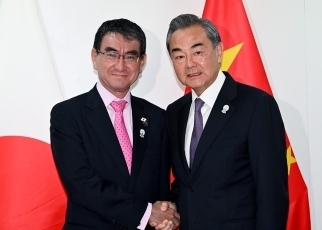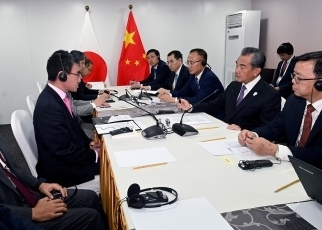Japan-China Relations
Japan-China Foreign Ministers’ Meeting
August 1, 2019


On August 1 commencing at 11:10 a.m. local time (1:10 p.m. JST) for approximately 30 minutes (simultaneous interpretation), Mr. Taro Kono, Minister for Foreign Affairs of Japan, during his visit to Bangkok, the Kingdom of Thailand to attend the ASEAN-related Foreign Ministers’ Meetings, held a Japan-China Foreign Ministers’ Meeting with H.E. Mr. Wang Yi, State Councilor and Foreign Minister of the People’s Republic of China. The overview of the meeting is as follows.
1 Beginning
(1) The summary of State Councilor and Foreign Minister Wang’s opening remarks is as follows.
- Japan-China relations have maintained a momentum of positive development, and we will continue to value this.
- On the occasion of the recent G20 Osaka Summit, we appreciate Japan’s arrangements that attached importance to President Xi Jinping’s visit to Japan. Prime Minister Abe and President Xi reached many important common views suitable for a “new era of Japan-China relations.” In particular, Prime Minister Abe invited President Xi to pay a state visit to Japan next spring, and it is highly significant that President Xi accepted the invitation.
- For the next stage, I am eager to work with you to translate the common views of the two leaders into action and develop Japan-China relations in a sound and stable manner.
(2) The summary of Minister Kono’s response is as follows.
- We highly appreciate China’s contribution at the G20 Summit. It was extremely important that the G20 leaders were able to send out a unanimous message regarding such issues as the world economy, trade, innovation and digitalization, environment, and global issues. Japan and China were able to demonstrate domestically and internationally a model of the “new era of Japan-China relations” in which the two countries will work shoulder to shoulder to contribute to regional and international issues.
- The Japan-China Summit Meeting and dinner on the eve of the G20 Summit was a great success. In particular, the agreement in principle on President Xi’s state visit to Japan next spring has important significance for making further progress on Japan-China relations which have gotten back on a normal track.
- Against the backdrop of such positive developments, I look forward to holding frank discussions on deepening Japan-China relations ahead of next spring.
2 Japan-China Relations
(1) Both sides welcomed that discussions on the same wavelength were held between Prime Minister Abe and President Xi at the Japan-China Summit Meeting and dinner in the margins of the G20 Osaka Summit, further deepening the relationship of trust between the leaders. Both sides shared the view that they would both make efforts towards the successful state visit to Japan by President Xi next spring.
(2) Both sides shared the recognition that it was important to keep holding continuous dialogue at various levels, and held concrete discussions regarding the diplomatic schedule for the second half of this year.
Both sides welcomed that the two countries have already held this year the Consultations on Latin America and the Caribbean, Consultations on Disarmament and Non-Proliferation, and Senior Working-Level Maritime Consultations, in accordance with the annual plan for dialogues and exchanges between diplomatic authorities prepared on the occasion of Prime Minister Abe’s visit to China in October 2018. Both sides shared the view that they would continue to actively promote dialogues and exchanges in various areas.
(3) Both sides shared the recognition that, amid significant improvements in the atmosphere of overall Japan-China relations, it was important to create constructive interaction for matters of mutual interest.
State Councilor and Foreign Minister Wang stated that China intends to advance working-level economic cooperation, noting the Japan-China High-Level Economic Dialogue held in April 2019, business cooperation in third countries, innovation cooperation, and cooperation on environmental preservation. From the perspective of promoting free trade, State Councilor and Foreign Minister Wang stated that China will aim to conclude the negotiations on the Regional Comprehensive Economic Partnership (RCEP) by the end of this year and intends to work with Japan on the Japan-China-ROK free trade agreement (FTA).
Minister Kono once again strongly requested China’s positive responses to: (1) the issues of the East China Sea, including intrusion of Chinese government vessels into Japan’s territorial waters surrounding the Senkaku Islands and implementation of the “2008 Agreement” regarding resource development; (2) China’s import restrictions on Japanese food products and expansion of Japanese agricultural exports to China; and (3) detainment of Japanese nationals in China.
(4) Both sides reaffirmed that they would continue to coordinate on a high-level dialogue framework for people-to-people and cultural exchanges, on which their leaders agreed to launch by the end of the year, and that it was important to promote exchanges among the young generation, including school trips. Minister Kono explained that Japan intends to make tourism to Japan more convenient through its recently approved introduction of online visa applications and electronic visas.

